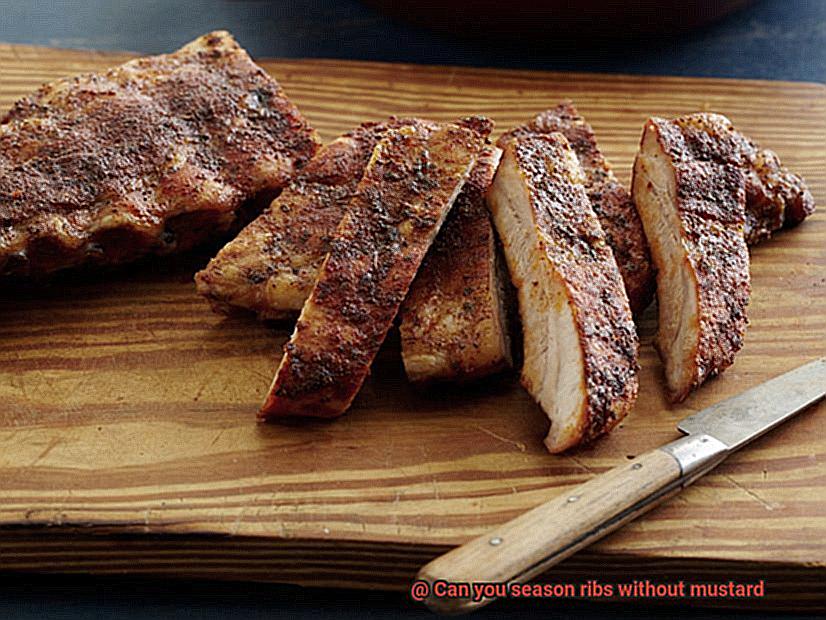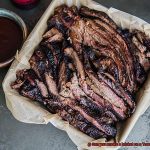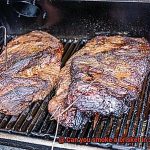Are you a barbecue fanatic who can’t resist the tantalizing aroma of perfectly cooked ribs? If so, then you know that seasoning is key to achieving that mouth-watering flavor. But what if you’re not a fan of mustard or have an allergy to it? Fear not, because seasoning ribs without mustard is entirely possible and even allows for more experimentation with different flavors.
From savory to sweet and tangy, there are countless options for seasoning your ribs without mustard. You can try out various blends, rubs, marinades, and BBQ sauces to create your perfect match. Don’t limit yourself to just one ingredient when there’s a whole world of flavors waiting for you.
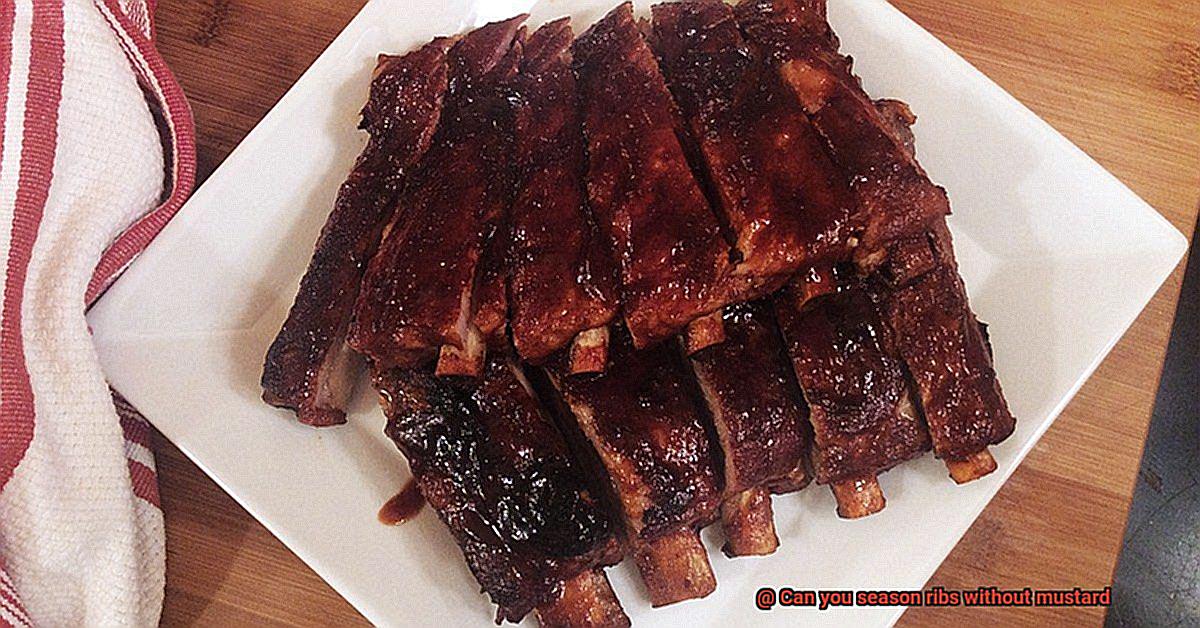
In this blog post, we’ll take a deep dive into the art of seasoning ribs without mustard. We’ll break down the essential ingredients and spices that will make your taste buds dance with joy. Whether you’re a seasoned grill master or just starting out, we’ve got some fantastic tips and tricks up our sleeve to help you create the most delicious and succulent ribs ever.
So get ready to fire up your grill and let’s explore the wonderful world of seasoning ribs without mustard.
Contents
What is Mustard?
You may have heard that mustard can be used as a base for seasoning. But what exactly is mustard, and how can it be used to enhance the flavor of your ribs?
Mustard is a condiment that has been used for thousands of years, tracing back to ancient Rome and Greece. Made from the seeds of the mustard plant, this flavorful sauce or paste is typically mixed with vinegar or other liquids to create its signature tangy taste. There are several types of mustard available, including yellow mustard, Dijon mustard, and spicy brown mustard.
If you choose to use mustard as a base for your rib seasoning, the acidity in the condiment can help tenderize the meat while adding a tangy flavor. However, it’s important to note that using mustard is not essential for great-tasting ribs. There are plenty of other seasoning options available that can create an incredible flavor profile for your ribs.
One popular alternative to using mustard is a dry rub. Consisting of a mixture of spices and herbs that are rubbed onto the ribs before grilling or smoking, dry rubs can be customized to suit your personal taste preferences. Common ingredients include paprika, chili powder, garlic powder, onion powder, and brown sugar.
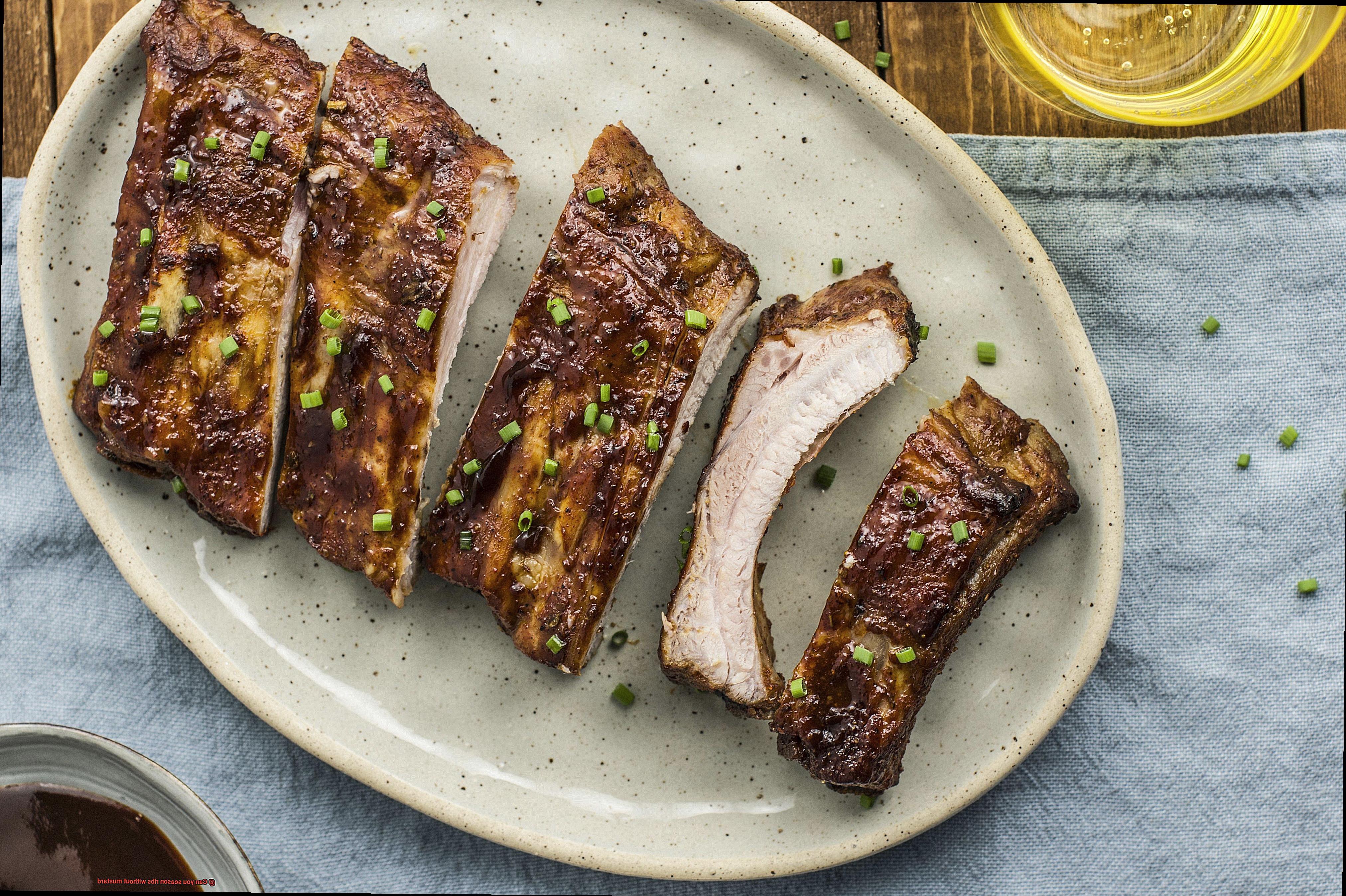
Another option is a wet rub or marinade. Wet rubs consist of a blend of spices, herbs, and liquids that are applied to the ribs before cooking. This type of seasoning typically includes ingredients such as olive oil, soy sauce, Worcestershire sauce, honey, and apple cider vinegar. Marinades have a higher liquid content than wet rubs and may include ingredients like fruit juice or wine.
Regardless of which seasoning method you choose, it’s important to allow your ribs to rest after applying the seasoning. This allows the flavors to penetrate the meat and helps create a delicious crust on the outside of the ribs when they are cooked.
In addition to its use as a condiment and seasoning agent, mustard has been used for medicinal purposes throughout history. Its anti-inflammatory properties have been used to treat various ailments such as arthritis and respiratory issues.
Why Some People Don’t Want to Use Mustard for Rib Seasoning
While this ingredient has been a go-to for many, some people prefer to avoid using it. So why do some people choose not to use mustard for rib seasoning? Let’s explore this question.
Personal preference is one of the critical factors behind this decision. Some individuals may not like the taste of mustard and opt for other ingredients to season their ribs. Moreover, dietary restrictions or allergies can also be a reason why someone would choose to skip using mustard.
Another reason for avoiding mustard as a base for seasoning is that it can hide the natural flavor of the meat. Ribs are an incredibly delicious cut on their own, and some grill masters prefer to let the meat speak for itself without any added tanginess.
Furthermore, some people believe that using mustard as a base can result in an overpowering “mustardy” taste that overshadows other flavors. Instead, they prefer to apply their rub directly onto the meat or use other bases such as olive oil or honey.
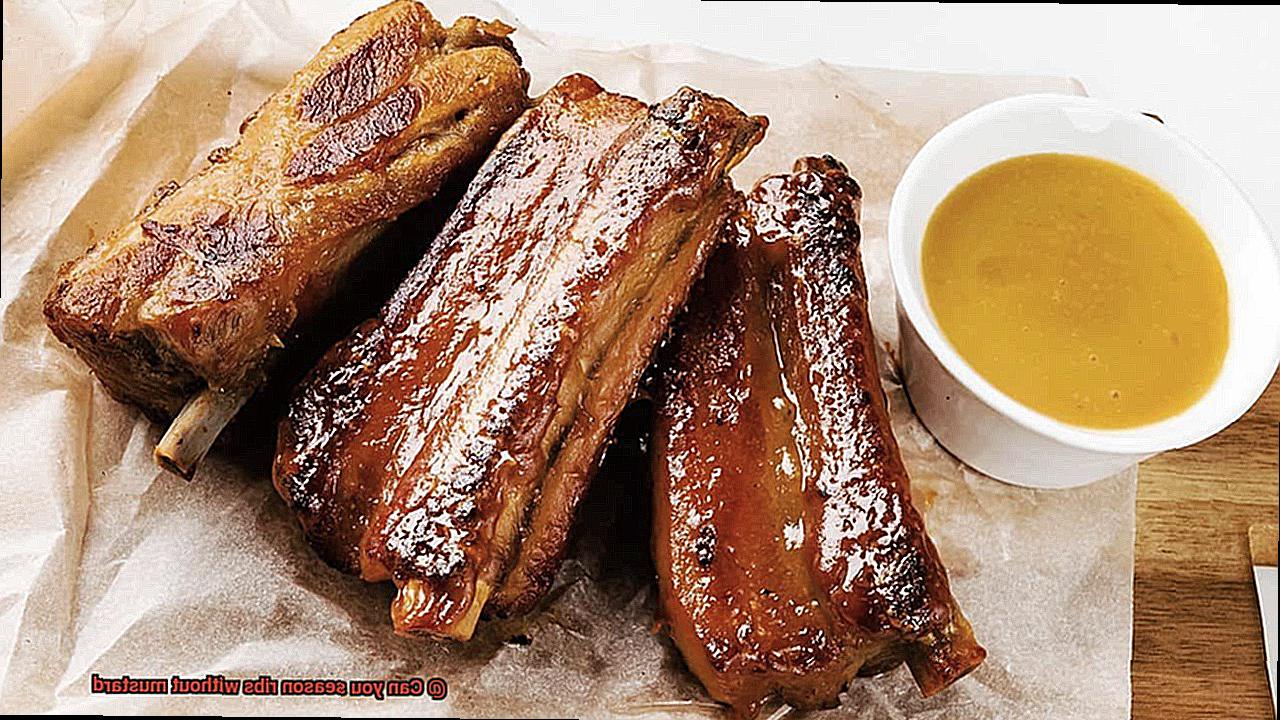
Alternatives to Using Mustard as a Base for Rib Seasoning
When it comes to seasoning ribs, mustard has long been a go-to choice for many grill masters. Its tangy flavor and ability to help the rub adhere to the meat make it hard to resist. However, if you’re looking for something new or simply not a fan of mustard, fear not. There are plenty of alternatives that can take your rib seasoning game to the next level.
One of the top contenders is oil. Any type of oil will do, whether you prefer olive oil, vegetable oil, or even coconut oil. Brushing the ribs with oil before applying the dry rub will help the seasoning stick just as well as mustard. Plus, it won’t overpower the natural flavor of the meat.
If you’re feeling daring, why not try using mayonnaise as your base? Yes, you read that right – mayonnaise. The vinegar and egg yolks in mayo can tenderize and flavor the meat in a unique way. Simply spread a thin layer on the ribs before adding the dry rub and be prepared for some seriously delicious results.
For those with a sweet tooth, honey is an excellent option. Mix it with a little water to make it easier to spread onto the meat, then add your favorite dry rub on top. The honey will caramelize during cooking and create a sweet and sticky glaze on the ribs that is sure to satisfy.
Finally, some grill enthusiasts swear by using apple juice or apple cider vinegar as their base for rib seasoning. These liquids add both flavor and moisture to the meat, helping to keep it juicy during cooking. Brush either one onto the ribs before adding your dry rub and prepare for some seriously succulent results.
Dry Rubs: Ingredients and Tips
Ribs are a beloved barbecue staple that many people enjoy. The key to making amazing ribs is in the seasoning, and while mustard powder is a popular choice, it’s not the only option. If you’re looking to avoid mustard powder in your dry rub, here are five tips for creating a flavorful and delicious seasoning:
Choose the Right Ingredients
When making a dry rub for ribs, it’s important to use the right ingredients. Some popular spices include paprika, garlic powder, onion powder, cumin, chili powder, and black pepper. Brown sugar or white sugar can also be added to balance out the flavors. Salt is also essential to bring out the flavors of the other ingredients.
Toast Your Spices
Toasting your spices before using them is an important step in making a dry rub. This process helps release their natural oils and intensifies their flavors. Simply heat them in a dry skillet over medium heat for a few minutes until fragrant.
Apply Generously
When applying the dry rub to your ribs, make sure to do so generously and evenly on all sides. Let the seasoned ribs sit for at least an hour before cooking to allow the flavors to penetrate the meat and create a delicious crust on the outside.
Customize Your Rub
The beauty of making your own dry rub is that you can customize it to your liking by adding or subtracting different spices or adjusting the quantities of each ingredient. Don’t be afraid to experiment with different flavor combinations until you find one that suits your taste buds.
Let Your Ribs Rest
After applying your dry rub, it’s essential to let your ribs rest for at least an hour or overnight in the fridge before cooking them. This allows the flavors to penetrate deeply into the meat and create a mouth-watering crust on the outside.
Wet Rubs and Marinades: Ingredients and Tips
Wet rubs and marinades are an excellent way to enhance the flavor of ribs without using mustard. These two methods offer a variety of ingredients and combinations to create unique and delicious flavor profiles. Here are five sub-sections that explore the ingredients and tips to consider when creating wet rubs and marinades for ribs.
Wet Rubs: A Flavorful Mixture
Wet rubs consist of a combination of spices, herbs, and liquids that are applied directly to the meat before grilling. The liquid component can vary from oil to citrus juice to vinegar, depending on the desired flavor profile. Some common wet rub ingredients include garlic, paprika, cumin, brown sugar, and soy sauce.
When creating a wet rub, it’s important to use fresh ingredients for a stronger flavor. It’s also crucial not to overdo it with the seasoning because too much can overpower the meat. Give the meat enough time to soak up the flavors by allowing it to rest after applying the rub. If your wet rub is too sweet, balance it out by adding more acid or salt.
Marinades: The Secret to Tender Meat
Marinades involve soaking the ribs in a flavorful liquid for several hours or overnight before grilling. Marinades typically contain acid (such as lemon juice or vinegar) to help tenderize the meat, as well as spices and herbs for flavor. Some popular marinade ingredients for ribs include honey, Worcestershire sauce, apple cider vinegar, and chili powder.
When creating a marinade for ribs, consider the cooking method you will be using and how long you will be marinating the meat. Avoid using acidic ingredients for too long as it can make the meat tough. A good rule of thumb is to marinate your ribs for at least 4 hours but no more than 24 hours.
Get Creative with Your Ingredients
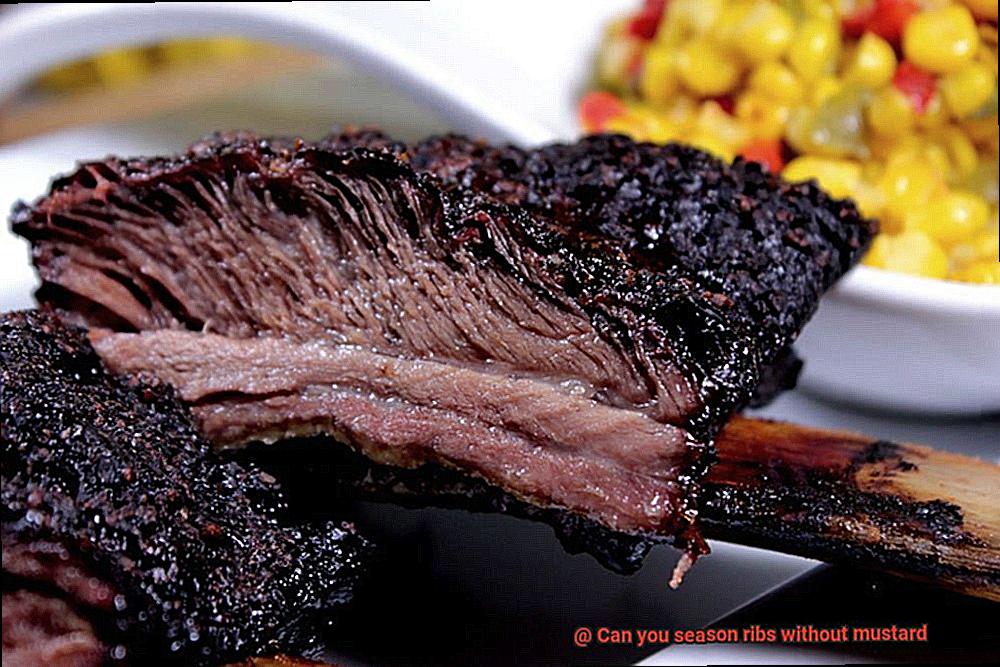
There are many ingredients that can be used to create flavorful wet rubs and marinades for ribs. Experiment with different combinations of oil, vinegar, citrus juice, soy sauce, honey, garlic, onion powder, chili powder, paprika, cumin, and brown sugar. Try a simple wet rub with olive oil, soy sauce, garlic, and chili powder or a complex marinade with orange juice, lime juice, honey, cumin, paprika, and brown sugar.
Let the Ribs Rest
Whether you choose to use a wet rub or marinade, it’s important to let the ribs rest after seasoning. This allows the flavors to penetrate the meat and helps create a delicious crust on the outside of the ribs when they are cooked.
Letting the Ribs Rest After Applying the Seasoning
You can still achieve mouth-watering, flavorful ribs without it. But before you dive into seasoning your ribs, let’s talk about the importance of letting them rest after applying the seasoning.
Allowing your ribs to rest for at least 30 minutes after seasoning is crucial to infuse that delicious flavor into the meat and prevent the seasoning from falling off during cooking. So, take a step back and let those flavors work their magic. Trust us, it’s worth the wait.
But how long should you let your ribs rest? Well, it depends on what type of seasoning you’re using. If you’re using a dry rub, give them up to an hour to rest. But if you’re using a wet marinade, 30 minutes is sufficient. During this resting period, it’s best to keep your ribs in a cool place like the refrigerator to prevent them from drying out.
Now, some of you may be wondering if covering your ribs during resting is necessary. The simple answer is yes. Covering them with plastic wrap or foil will protect them from drying out and keep all those delicious flavors locked in.
In summary, letting your seasoned ribs rest before cooking is an essential step in achieving the perfect flavor profile. And while mustard can be helpful in binding the seasoning to the meat, it’s not necessary for amazing tasting ribs. So, feel free to get creative with your seasonings and marinades and let those ribs rest for a truly satisfying meal.
Finding the Right Balance of Flavors
I’m here to guide you in finding the perfect balance of flavors for succulent, mouth-watering ribs that will leave your taste buds dancing.
Let’s start by ditching the traditional mustard-based rub and exploring a world of possibilities with different spices and seasonings. While paprika, garlic powder, onion powder, cumin, and chili powder are all excellent options, don’t be afraid to experiment with other flavors. Add a touch of sweetness with brown sugar or honey, or a tangy kick with vinegar or citrus juice. The key is to find a combination that suits your taste buds.
When it comes to seasoning your ribs, remember that the type of meat and cooking method will affect the flavor. Baby back ribs are smaller and more delicate, so a lighter hand with seasoning is necessary. Spare ribs, on the other hand, can handle more seasoning, especially if cooked low and slow for several hours.
But seasoning is just one part of the equation. The way you cook your ribs will also play a big role in their flavor and tenderness. Whether you choose to grill, bake in the oven, or smoke in a smoker, each method will bring out different flavor profiles in your ribs. Experiment with different cooking methods until you find the perfect match for your seasoning blend.
One pro tip is to let your seasoned ribs rest for at least 30 minutes before cooking to allow the flavors to soak into the meat. Covering them during resting will ensure they stay moist and lock in all those mouth-watering flavors.
Experimentation and Practice for Perfect Results
It’s time to take your taste buds on an adventure with a variety of seasonings and spices. Experimentation and practice are the keys to finding the perfect blend that will make your ribs stand out.
Let’s start by understanding the role of mustard in a rib rub. While it’s known for its tangy flavor, it also acts as a binder to help the seasoning stick to the meat. However, don’t fret; there are alternative binders such as olive oil, honey, or even Worcestershire sauce that can do the job just as well.
Now, let’s get to the fun part – experimenting with different seasonings. Begin with a simple rub consisting of salt, pepper, and garlic powder. Then, be adventurous and add other spices and herbs like paprika, cumin, thyme, or rosemary. Keep track of what works well and what doesn’t by taking notes so you can adjust accordingly.
It’s also important to consider the cooking method when seasoning ribs without mustard. If you’re smoking low and slow, a robust blend of spices will complement the smoky flavor. Conversely, if you’re grilling over high heat, a lighter seasoning will allow the natural flavors of the meat to shine through.
Perfecting your rib seasoning without mustard takes practice and patience. Don’t be afraid to try new things and have fun with it. Below are some tips to help you experiment like a pro:
- Start with a basic rub and build from there
- Keep notes on what works well
- Experiment with different binders like olive oil or honey
- Consider the cooking method when choosing your spices
Conclusion
To conclude, seasoning ribs without mustard is not only possible but also opens up a world of possibilities for flavor experimentation. While mustard is commonly used as a base for seasoning, there are plenty of alternatives available that can create an incredible flavor profile for your ribs. Dry rubs, wet rubs, and marinades are all excellent options to consider when seasoning your ribs.
When creating your own dry rub or wet rub/marinade, using fresh ingredients is crucial to achieve a stronger flavor. Additionally, letting your seasoned ribs rest before cooking is essential to infuse those delicious flavors into the meat and prevent the seasoning from falling off during cooking.
Achieving succulent, mouth-watering ribs requires practice and experimentation. It’s important to understand the role of mustard in a rib rub and find alternative binders such as olive oil or honey that can do the job just as well. Experimenting with different spices and herbs like paprika, cumin, thyme, or rosemary is also key in finding the perfect blend that will make your ribs stand out.
In short, whether you’re an experienced grill master or just starting out, there’s no need to limit yourself to mustard-based seasonings when it comes to making delicious ribs.

